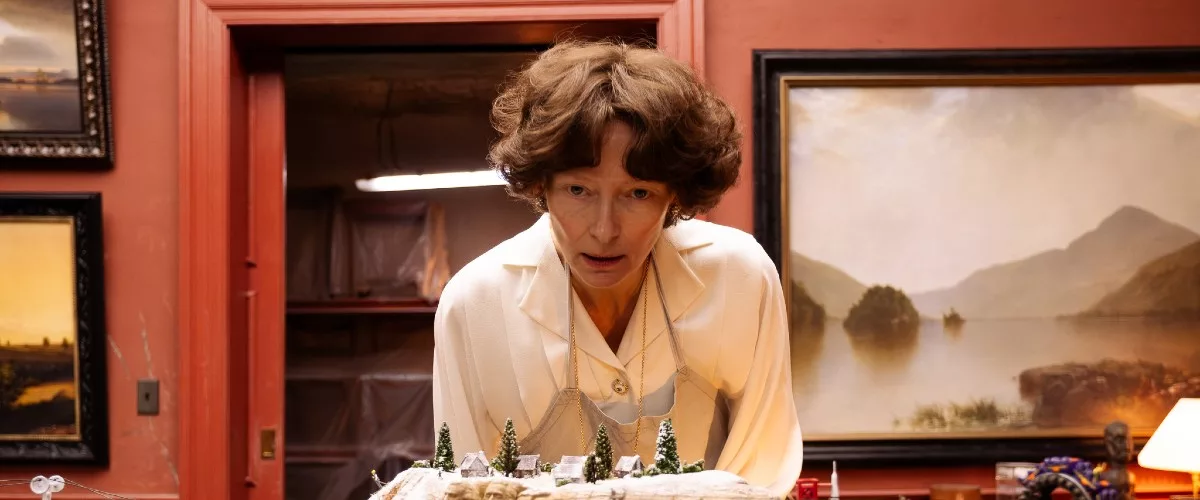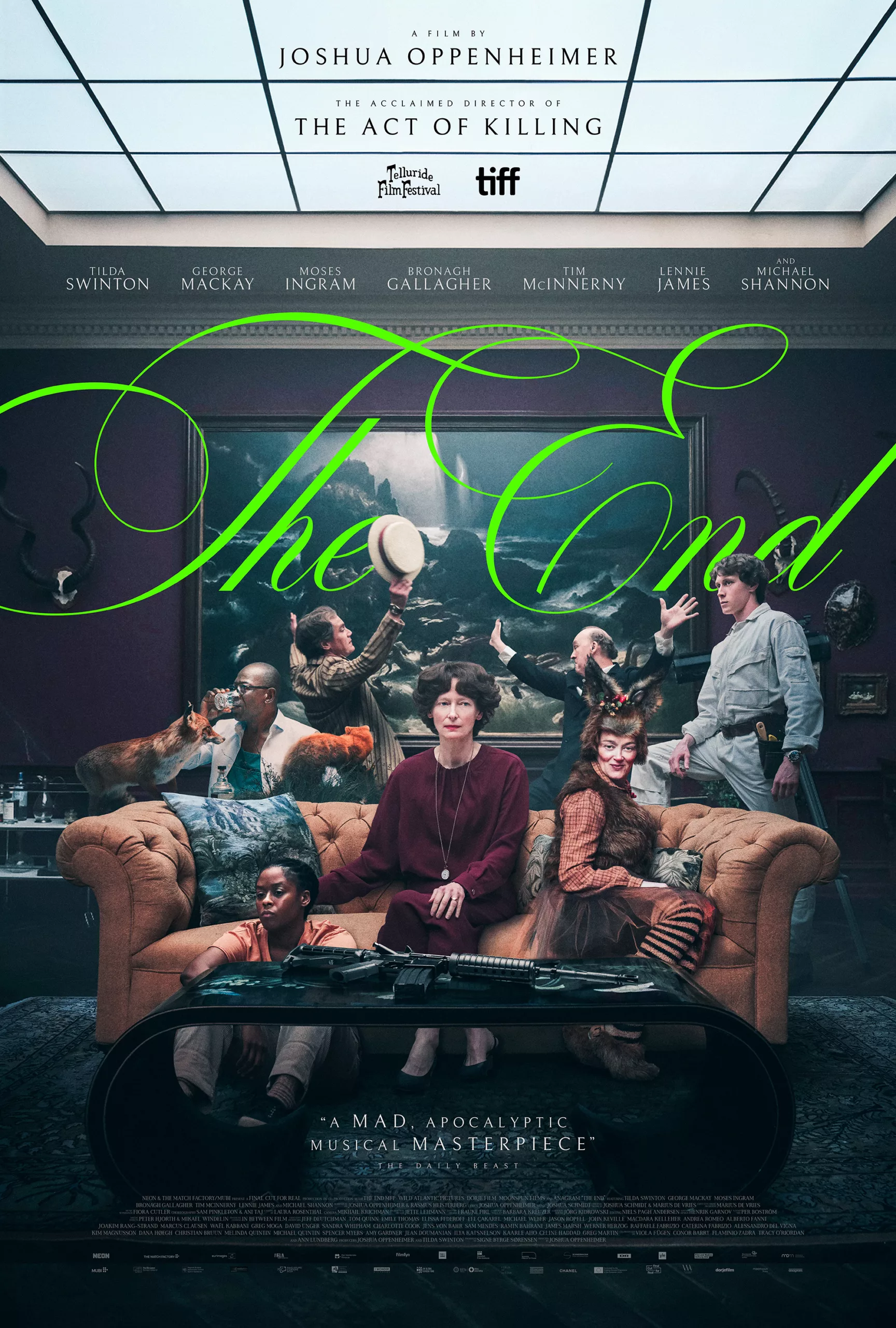In Joshua Oppenheimer’s daring twin documentaries, “The Act of Killing” (2012) and “The Look of Silence” (2014), he attempts to penetrate the phantasmagorical headspace of the gangsters involved in Indonesia’s genocidal campaign against Communists in the mid-’60s. Oppenheimer encourages these men to re-enact the killings, which they do to an operatic extent. Disturbing doesn’t even cover the result. The willingness to participate in the documentaries is astonishing, bringing up fascinating discussions about power, psychology, and denial. Even the glimpse, later on, of one of them appearing to confront his murderous past with something other than a sense of pride and celebration … fails to erase what we have seen or absolve this man. These documentaries examined a very important subject, but what got everyone talking was Oppenheimer’s radical conception.
His latest film, “The End,” features a similarly radical conception. “The End” is a narrative feature about a family holed up in a palatial bunker, after climate change has torched the earth beyond habitation. They retreated to the bunker 20 years prior. The dystopian sets built, the massive eerie underground caves and tunnels, whorled and grooved with time create disturbing reverberations, feel similar to some of the “re-enactments” in “The Act of Killing”. It’s how we imagine the end of the world. The cast never goes outside. We never see what it looks like “out there”. So far pretty standard. But Oppenheimer has chosen to make “The End” an old-fashioned musical. With songs composed by Josh Schmidt and lyrics by Oppenheimer, “The End” unfurls in a series of fits and starts, slightly repetitive, the story interrupted by musical numbers, some of which are contemplative soliloquies, others duets, others a group experience.
Some of the songs are almost catchy, with interesting chord changes and rhythms. One number might even be called “toe-tapping”. The cast, as a whole, are not singers, and the music strains their capabilities. Pretty sounds are clearly not what Oppenheimer is after. How well this works depends on your tolerance for experimentation (particularly experiments that don’t quite work). A film like “Hundreds of Beavers,” on my Top 10 this year, is an audacious experiment in silent-filmmaking and slapstick, featuring humans running around in the snow wearing animal costumes. On paper, it sounds nuts. In execution, it is nuts. And it puts many other films to shame, since it so clearly comes from a personal place. “Megalopolis” is an experiment. We don’t have to like the result, but in an increasingly play-it-safe world, where the bottom line dominates, experiments like “The End” are a breath of fresh air.
The no-name characters cluster in the claustrophobic space. Politeness, even formality, is required. Anything messier would never survive 20 years in isolation. No one questions anyone else’s self-mythology. Father (Michael Shannon) was an “oilman” of some kind “before”, now working on a memoir (which no one will read), justifying his participation in an industry that helped end the world. He had the means to construct a bunker, and retreat there with his family. Mother (Tilda Swinton) was a ballerina, and still reminisces about performing at the Bolshoi. Mother’s Friend (Bronagh Gallagher) was a chef, and her cooking skills come in handy. The Doctor (Lennie James) oversees safety precautions (putting them through rigorous drills), and also doles out medication. There’s a butler (Tim McInnery), always on hand with a tray of drinks. Father and Mother have a son (George MacKay), born in the bunker. He knows nothing of the time before.
The set-up is reminiscent of “Blast from the Past,” including the stern, formal father, the flighty, snippety mother, and the son’s man-boy arrested development. The son spends his time constructing a train set out of the detritus of American history (complete with Hollywood sign), and helping his father write the memoir (inventing incidents to soften the father’s past behavior). The vibe is not exactly homey: these people are strange. But they are, at least, living in a status quo of accord, until one day they discover a Girl (Moses Ingram) collapsed outside their door. She has been on a long journey through the terrifying outside world. The family debates what to do with her. No one has “visited” in 20 years. (What happened to the “visitors” 20 years ago?) Son develops a crush on Girl. Friend advocates for allowing her to stay. Mother is a tougher nut to crack. Girl looks around, trying to interpret these people. She attempts to do whatever they say because she knows if they kick her out, she won’t make it.
The Girl’s arrival starts the process of unraveling the self-mythologizing of each member of the isolated group. Although each person’s story is different, there’s a sameness to the revelations: everyone had to make heartless choices when they retreated to the bunker. The “unraveling” is more tedious than revelatory. It’s expected. Hearing Michael Shannon and Tilda Swinton sing these challenging interior ballads is a little bizarre, but at the same time, there’s so much vulnerability in how openly they toss themselves into the project and how much they trust the experiment. It was unexpectedly moving.
Moses Ingram made her debut as “Jolene” in “The Queen’s Gambit.” She made a vivid impression in the first episode, and her return in the final episode was one of the climaxes. This was entirely due to what Ingram brings to the table: a world-weary acceptance and humor, but also openness to her own pain, her regrets, and her calm acceptance of her subjective experience. She is the emotional and ethical center of “The End.”
The film opens with a couplet from T.S. Eliot’s apocalyptic “The Four Quartets”:
The houses are all gone under the sea.
The dancers are all gone under the hill.
After watching the film, another section came to mind:
Dawn points, and another day
Prepares for heat and silence. Out at sea the dawn wind
Wrinkles and slides. I am here
Or there, or elsewhere. In my beginning.
In the “beginning” is also “the end”. The experiment of “The End” may not entirely work, but it is good that it exists.




















